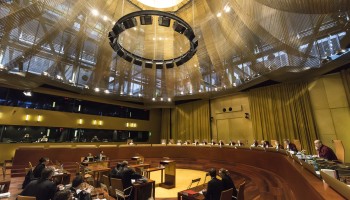Reported by
Malta’s golden passport scheme violates European Union law, a top court ruled on Tuesday, making it illegal for the Mediterranean island nation to continue selling citizenship in return for investment.
“The current scheme has been declared contrary to EU law and must therefore be scrapped or changed to conform with the judgement,” a spokesperson for the European Court of Justice told OCCRP.
Malta could incur fines if it fails to comply with the court’s ruling, the spokesperson added.
“At this moment the legal implications of this judgment are being studied in detail, so that the regulatory framework on citizenship can then be brought in line with the principles outlined in the judgment,” the government said in a statement.
In its ruling, the court said EU law requires a successful application for citizenship to be based on “a genuine link to the country.”
Malta’s program providing citizenship in exchange for investment “amounts to the commercialisation of the grant of the nationality of a Member State and, by extension, of Union citizenship,” the court said in a statement.
Critics have warned that so-called golden passport programs can allow unsavoury characters to gain access to the EU by investing funds they may have obtained through corruption or crime abroad.
Malta is the sole remaining EU member state to offer citizenship by investment after Bulgaria and Cyprus scrapped their programs under pressure from the European Commission. The Commission brought a legal challenge against Malta in 2023.
The Maltese government had argued in court that nothing in EU law demands that citizenship be based on genuine links to a country.
Speaking to journalists who investigated Malta’s golden passport program in 2021, a government spokesperson downplayed fears that it could allow criminals into the EU. The screening of applicants “involves Interpol and Europol database checks, border controls and physical presence in Malta,” the spokesperson said at the time.
However, journalists have found evidence that the program provided Maltese citizenship to controversial individuals, including Russian oligarchs and people later convicted of crimes.
Pavel Grachev, the former CEO of Russia’s leading gold producer, Polyus, bought Maltese passports for himself and his family in 2017. The U.S. sanctioned him in 2023 as part of an effort to put pressure on companies and individuals supporting Russia’s war in Ukraine.
Maltese authorities said last year that they were considering revoking the passport of Semen Kuksov, the son of a Russian former oil executive, after the young man was convicted in the U.K. of laundering criminal funds. However, there is no indication that Kuksov’s passport has been revoked, even as he serves his sentence.
The only person known to have been stripped of his Maltese citizenship is Pavel Melnikov, a Russian financier who bought an island in Finland and installed accommodation, as well as a helicopter landing pad. Amid speculation that he was establishing a secret outpost for the Russian military, Finish officials charged him with accounting and pension fraud, and he was convicted in February
In its statement responding to the EU court judgement on Tuesday, the Maltese government said its citizenship by investment program had generated more than 1.4 billion euros ($1.6 billion) in revenue since 2015. Much of the money was spent on social programs, it said, including more than $68 million allocated to social housing.






